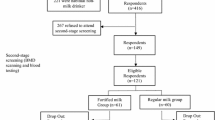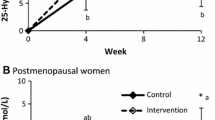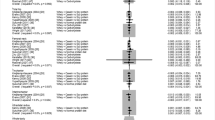Abstract
Summary
Current treatments for postmenopausal osteoporosis suffer from side effects. Safe and natural milk proteins, ribonuclease, and lactoferrin promote formation of new capillaries and bone formation. A ribonuclease-enriched lactoferrin supplement studied here, demonstrates significant reduction in resorption and increase in formation, towards restoring the balance of bone turnover within 6 months.
Introduction
Osteoporosis, a major health issue among postmenopausal women, causes increased bone resorption and reduced bone formation. A reduction in angiogenesis could also contribute to this imbalance. Current treatments such as hormone replacement therapy and bisphosphonates have drawbacks of severe side effects. Milk ribonuclease (RNase) is known to promote angiogenesis and lactoferrin (LF) to stimulate bone formation by osteoblasts. We examine the effect of ribonuclease-enriched lactoferrin supplement on the bone health of postmenopausal women.
Methods
A total of 38 healthy, postmenopausal women, aged 45 to 60 years were randomized into placebo or RNAse-enriched-LF (R-ELF) supplement groups. The bone health status was monitored by assessing bone resorption markers, serum N-telopeptides (NTx), and urine deoxypyridinoline (Dpd) crosslinks and serum bone formation markers, bone-specific alkaline phosphatase (BAP), and osteocalcin (OC).
Results
R-ELF supplementation demonstrated a decrease in urine Dpd levels by 14% (19% increase for placebo) and serum NTx maintained at 24% of the baseline (41% for placebo), while serum BAP and OC levels showed a 45% and 16% elevation (25% and 5% for placebo).
Conclusions
R-ELF supplementation demonstrated a statistically significant reduction in bone resorption and increase in osteoblastic bone formation, to restore the balance of bone turnover within a short period.




Similar content being viewed by others
References
Melton U, Chrischilles EA, Cooper C et al (1992) How many women have osteoporosis? J Bone Miner Res 7:1005–1010
Melton LJ 3rd, Atkinson EJ, O’Connor MK et al (1998) Bone density and fracture risk in men. J Bone Miner Res 13:1915
Collins JA, Blake JM, Crosignani PG (2005) Breast cancer risk with postmenopausal hormonal treatment. Hum Reprod Update 11:545–560
Herrington DM, Howard TD (2003) Hormone therapy and heart disease: from presumed benefit to potential harm. N Engl J Med 349:5519–5521
Makins R, Ballinger A (2003) Gastrointestinal side effects of drugs. Expert Opin Drug Safety 2:421–429
Kawakami H (2005) Biological significance of milk basic protein (MBP) for bone health. Food Sci Technol 11:1–8
Aoe S, Toba Y, Yamamura J et al (2001) Controlled trial of the effects of milk basic protein (MBP) supplementation on bone metabolism in healthy adult women. Biosci Biotechnol Biochem 65:913–918
Yamamura J, Aoe S, Toba Y et al (2002) Milk basic protein (MBP) increases radial bone mineral density in healthy adult women. Biosci Biotechnol Biochem 66:702–704
Morita Y, Matsuyama H, Serizawa A et al (2008) Identification of angiogenin as the osteoclastic bone resorption-inhibitory factor in bovine milk. Bone 42:380–387
Glowacki J (1998) Angiogenesis in fracture repair. Clin Orthop 355S:S82–S89
Carano RAD, Filvaroff E (2003) Angiogenesis and bone repair. Drug Discov Today 8:980–989
Cornish J, Callon KE, Naot D et al (2004) Lactoferrin is a potent regulator of bone cell activity and increases bone formation in vitro. Endocrinology 145:4366–4374
Naot D (2005) Lactoferrin: a novel bone growth factor. Clin Med Res 3:93–101
Naidu AS (2008) Angiogenin complexes (ANGex) and uses thereof. US Patent Application No. 20080255340
Naidu AS (2008) Immobilized angiogenin mixtures and uses thereof. US Patent Application No. 20080254018
Gomez B Jr, Ardakani S, Ju J et al (1995) Monoclonal antibody assay for measuring bone-specific alkaline phosphatase activity in serum. Clin Chem 41(11):1560–1566
Delmas PD, Stenner D, Wahner HW et al (1983) Assessment of bone turnover in postmenopausal osteoporosis by measurement of serum bone gla-protein. J Lab Clin Med 102:470–476
Clemens JD et al (1997) Evidence that serum NTx (collagen type I N-telopeptides) can act as immunochemical marker of bone resorption. Clin Chem 43:2058–2063
Delmas PD, Schlemmer A, Gineyts E et al (1991) Urinary excretion of pyridinoline crosslinks correlates with bone turnover measured in iliac crest biopsy in patients with vertebral osteoporosis. J Bone Miner Res 6:639–644
Heinegard D, Tiderstrom G (1973) Determination of serum creatinine by a direct colorimetric method. Clin Chim Acta 43:305
Zar JH (1999) Biostatistical analysis, 4th edn. Prentice Hall, NJ, p 475
Eastell R, Mallinak N, Weiss S et al (2000) Biological variability of serum and urinary N-telopeptides of type I collagen in postmenopausal women. J Bone Miner Res 15:594–598
Scariano JK, Glew RH, Bou-Serhal CE et al (1998) Serum levels of cross-linked N-telopeptides and aminoterminal propeptides of type I collagen indicate low bone mineral density in elderly women. Bone 23:471–477
Gertz BJ, Clemens JD, Holland SD et al (1998) Application of a new serum assay for type i collagen cross-linked N-telopeptides: assessment of diurnal changes in bone turnover with and without alendronate treatment. Calcif Tissue Int 63:102–106
Clemens JD, Herrick MV, Singer FR et al (1997) Evidence that serum NTx (collagen-type I N-telopeptides) can act as an immunochemical marker of bone resorption. Clin Chem 43:2058–2063
Prestwood KM, Thompson DL, Kenny AM et al (1999) Low dose estrogen and calcium have an additive effect on bone resorption in older women. J Clin Endocrinol Metab 84:179–183
Rosen HN, Parker RA, Greenspan SL et al (2004) Evaluation of ability of biochemical markers of bone turnover to predict a response to increased doses of HRT. Calcif Tissue Int 74:415–423
Ton FN, Gunawardene SC, Lee H et al (2005) Effects of low-dose prednisone on bone metabolism. J Bone Miner Res 20:464–470
Greenspan SL, Parker R, Ferguson L et al (1998) Early changes in biochemical markers of bone turnover predict the long-term response to alendronate therapy in representative elderly women: a randomized clinical trial. J Bone Mineral Res 13:1431–1438
Garnero P, Shih WJ, Gineyts E et al (1994) Comparison of new biochemical markers of bone turnover in late postmenopausal osteoporotic women in response to alendronate treatment. J Clin Endocrinol Metab 79:1693–1700
Reid IR, Lucas J, Wattie D et al (2005) Effects of a β-blocker on bone turnover in normal postmenopausal women: a randomized controlled trial. J Clin Endocrinol Metab 90:5212–5216
Chen P, Satterwhite JH, Licata AA et al (2005) Early changes in biochemical markers of bone formation predict BMD response to teriparatide in postmenopausal women with osteoporosis. J Bone Miner Res 20:962–970
Suzuki YA, Lonnerdal B (2002) Characterization of mammalian receptors for lactoferrin. Biochem Cell Biol 80:75–80
Grey A, Banovic T, Zhu Q et al (2004) The low-density lipoprotein receptor-related protein 1 is a mitogenic receptor for lactoferrin in osteoblastic cells. Mol Endocrinol 18:2268–2278
Shestenko OP, Nikonov SD, Mertvetsov NP (2001) Angiogenin and its functions in angiogenesis. Mol Biol 35:294–314
Chesnut CH III, McClung MR, Ensrud KE et al (1995) Alendronate treatment of the postmenopausal osteoporotic woman: effect of multiple dosages on bone mass and bone remodeling. Am J Med 99:144–152
Ettinger B, Black DM, Mitlak BH et al (1999) Reduction of vertebral fracture risk in postmenopausal women with osteoporosis treated with raloxifene: results from a 3-year randomized clinical trial. JAMA 282:637–645
Lufkin EG, Whitaker MD, Nickelsen T et al (1998) Treatment of established postmenopausal osteoporosis with raloxifene: a randomized trial. J Bone Miner Res 13:1747–1754
Meunier PJ, Slosman DO, Delmas PD et al (2002) Strontium ranelate: dose-dependent effects in established postmenopausal vertebral osteoporosis—a 2-year randomized placebo controlled trial. J Clin Endocrinol Metab 87:2060–2066
Jamal SA, Cummings SR, Hawker GA (2004) Isosorbide mononitrate increases bone formation and decreases bone resorption in postmenopausal women: a randomized trial. J Bone Miner Res 19:1512–1517
Cosman F (2006) Anabolic therapy for osteoporosis: parathyroid hormone. Curr Rheumat Rep 8:63–69
Asirvatham S, Sebastian C, Thadani U (1998) Choosing the most appropriate treatment for stable angina. Safety considerations. Drug Saf 19:23–44
Vahle JL, Sato M, Long GG et al (2002) Skeletal changes in rats given daily subcutaneous injections of recombinant human parathyroid hormone (1–34) for two years and relevance to human safety. Toxicol Pathol 30:312–321
Hodsman AB, Bauer DC, Dempster DW et al (2005) Parathyroid hormone and teriparatide for the treatment of osteoporosis: a review of the evidence and suggested guidelines for its use. Endocr Rev 26:688–703
Hochberg MC, Greenspan S, Wasnich RD et al (2002) Changes in bone density and turnover explain the reductions in incidence of nonvertebral fractures that occur during treatment with antiresorptive agents. J Clin Endocrinol Metab 87:1586–1592
Acknowledgements
We thank Tiffani Davis (phlebotomist), Natver Patel, and Sreus Naidu for coordinating with the clinical study.
Funding
This project was funded by N-terminus Research Laboratories, Pomona, CA, USA.
Conflicts of interest
S. Bharadwaj, A. G. Tezus Naidu, and A. S. Naidu declares conflict of interest – all are employed by the N-terminus Research Laboratory. All other authors have no conflict of interest.
Author information
Authors and Affiliations
Corresponding author
Rights and permissions
About this article
Cite this article
Bharadwaj, S., Naidu, A.G.T., Betageri, G.V. et al. Milk ribonuclease-enriched lactoferrin induces positive effects on bone turnover markers in postmenopausal women. Osteoporos Int 20, 1603–1611 (2009). https://doi.org/10.1007/s00198-009-0839-8
Received:
Accepted:
Published:
Issue Date:
DOI: https://doi.org/10.1007/s00198-009-0839-8




